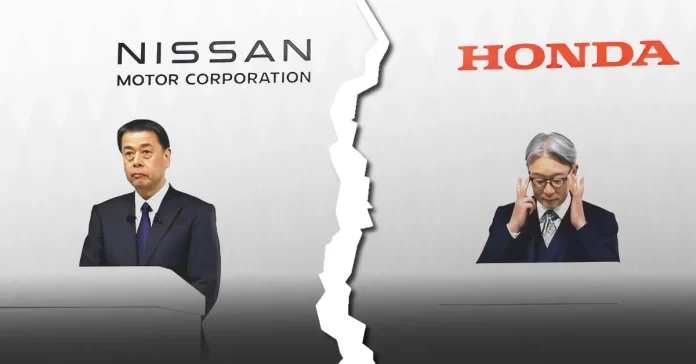In a significant move within the global automotive industry, Nissan Motor Co. and Honda Motor Co. have officially announced the end of their merger talks, citing strategic differences and governance issues. The decision, confirmed on February 13, 2025, brings an end to months of speculation about a possible mega-merger that could have reshaped the global auto landscape.
The merger was initially aimed at strengthening both companies against growing competition in the electric vehicle (EV) sector, particularly from Chinese and American automakers. However, fundamental disagreements on leadership roles, corporate structure, and long-term vision led to the talks collapsing.
The Vision Behind the Proposed Nissan-Honda Merger
The idea of a Honda-Nissan merger emerged in late 2024, with both companies facing mounting challenges in an increasingly competitive market.
- EV Market Pressure: With Tesla, BYD, and European brands aggressively expanding their electric vehicle portfolios, Nissan and Honda sought a stronger combined presence in the EV sector.
- Supply Chain Efficiencies: A merger would have allowed them to streamline production, reduce costs, and share battery technology, a key component in EV manufacturing.
- Global Expansion: By combining resources, Nissan and Honda aimed to expand their footprint in key markets like North America, Europe, and China.
Despite these advantages, internal disputes and differing corporate philosophies proved to be insurmountable obstacles.
Key Reasons Behind the Breakdown of Talks
1. Governance Disputes
One of the primary reasons for the collapse of the merger was a lack of consensus over corporate governance.
- Honda proposed a structure where Nissan would become a subsidiary, similar to the Renault-Nissan alliance.
- Nissan, however, rejected this idea, fearing it would lose its decision-making autonomy and identity.
2. Leadership & Control Issues
A major sticking point in the negotiations was leadership control.
- Honda CEO Toshihiro Mibe wanted a unified leadership model to allow for faster decision-making.
- Nissan CEO Makoto Uchida, however, insisted on a more independent approach, allowing both companies to maintain separate identities while collaborating on joint ventures.
3. Financial Performance Concerns
Both companies are struggling financially, but in different ways:
- Honda reported a 7% decline in profits for the nine months ending December 2024.
- Nissan forecasted a net loss of 80 billion yen ($519 million) for the fiscal year ending March 2025.
Merging two struggling entities without a clear financial recovery plan posed a significant risk.
Stock Market Reactions and Industry Impact
Following the announcement of the termination of merger talks, investor reactions were mixed.
- Honda’s stock rose by 2%, as investors welcomed the decision, fearing integration challenges.
- Nissan’s shares dipped, reflecting concerns over its ability to survive without a strong partner.
Industry analysts believe this failed merger highlights the increasing difficulty legacy automakers face in competing with tech-driven EV companies.
What’s Next for Nissan and Honda?
Despite the merger collapse, both companies are committed to collaborating in specific areas.
1. Electric Vehicle & Smart Car Development
Both automakers recognize the need to compete with Tesla and BYD in the EV space.
- Nissan and Honda will continue to co-develop battery technology and self-driving software.
- They will focus on improving AI-driven vehicle automation and energy-efficient battery solutions.
2. Nissan’s Independent Strategy
Nissan has announced several cost-cutting measures to regain stability:
- Workforce reduction: Nearly 9,000 jobs will be cut.
- Plant closures: Underperforming production facilities in Europe and Japan will shut down.
- New partnerships: Nissan is exploring alliances with other automakers, including potential U.S. and South Korean partners.
3. Honda’s Focus on Hybrid Tech
While Nissan focuses on full-electric models, Honda is doubling down on hybrid technology:
- It plans to expand its hybrid lineup before making a complete shift to EVs.
- Honda is investing heavily in solid-state batteries for future hybrid models.
Industry Reactions & Expert Opinions
Automotive Analysts Weigh In
Industry experts believe this failed merger has long-term implications:
- Daniel Klein, Senior Analyst at Auto Trends:
“The merger would have created a global powerhouse in the EV market. Its collapse raises questions about Nissan’s future viability.” - Dr. Aisha Patel, Tokyo-based Market Strategist:
“Honda’s decision to walk away suggests it sees a stronger future independently. Nissan, however, may need a new strategy.”
Competitor Reactions
The failed merger could benefit rival automakers:
- Toyota may solidify its dominance in the Japanese market.
- Hyundai and Kia could expand their EV presence in markets Nissan and Honda were targeting.
A Missed Opportunity or a Smart Decision?
While a Nissan-Honda merger had the potential to create an industry giant, fundamental differences in corporate structure, leadership vision, and financial strategies led to its downfall.
Moving forward, both companies will need to:
- Strengthen their individual EV strategies.
- Adapt to changing consumer preferences.
- Develop cost-efficient, sustainable technology to compete with Tesla and BYD.
Despite the collapse, the Japanese automotive industry remains strong, and both Nissan and Honda still have opportunities to regain market leadership through smart innovation and strategic alliances.
By – Nikita
Also Read – India Set to Introduce Comprehensive Income Tax Bill in Parliament




